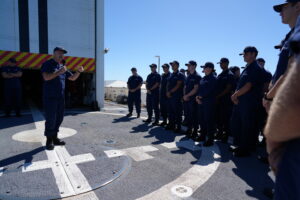JIATF-South, ‘Gold Standard’ for Interagency Cooperation
Joint Interagency Task Force South (JIATF-South) is recognized as the “gold standard” for interagency cooperation and intelligence fusion among U.S. agencies.
Located at Naval Air Station Key West, Florida, JIATF-South is one of three U.S. Southern Command (SOUTHCOM) task forces in support of national and partner nations’ security. Its director, U.S. Coast Guard Rear Admiral Mark J. Fedor, spoke with Diálogo about their mission and efforts to counter transnational organized crime (TOC) networks.
Diálogo: You assumed the duties of director of JIATF-South in July 2022. What has been the focus of your efforts?
U.S. Coast Guard Rear Admiral Mark J. Fedor, director of Joint Interagency Task Force South: We believe we are one of the more unique organizations in the federal government that is home to a diverse group of military, law enforcement, intelligence community, and partner nations to counter illicit narcotics smuggling and TOC networks. When I assumed command, the team developed five strategic pillars to guide our efforts. First, we want to continue enhancing our well-earned reputation as the Gold Standard for Interagency and International Cooperation. Second, in support of SOUTHCOM, we advance national security goals through the counternarcotics mission. Third, we need to innovate so we can elevate our success with the same level of resources. Fourth, we need to transform our workforce to ensure we have the right skill sets for the 21st century and our workplace through the construction of a new Command and Control facility in Key West. Finally, we’ll work through the process to right-size our authorities to meet the U.S. government’s needs in the 21st century.
Diálogo: JIATF-South conducts detection and monitoring operations to facilitate the interdiction of illicit trafficking in support of national and partner nations’ security. How are those operations coordinated?
Rear Adm. Fedor: We conduct our detection and monitoring (D&M) mission through collaboration and innovation. First, we fully leverage the diverse professional team we have here at JIATF-South. The command is comprised of five of the six Armed Services (only missing Space Force), 13 law enforcement and intelligence community members, and 24 foreign liaison officers (FLOs) from 20 different nations ranging from Mexico, Europe, Brazil, and Chile. I often say it’s a “coalition of the willing” on a good day, and like keeping “frogs in a wheelbarrow” on a challenging day. More often than not, it’s a good day where we bring our full team together to plan operations, innovate to increase effectiveness, execute with ruthless efficiency, and then learn from our experiences so we can apply it to the next evolution.
Diálogo: JIATF-South promotes interagency efforts across the Western Hemisphere and U.S. agencies. How is this accomplished?
Rear Adm. Fedor: We are proud of our strong relationships with the 20 different nations who are represented at JIATF-South. I truly value the personal relationships I’ve developed with our partner military leaders who are just as committed to this mission as we are. I believe we meet our partners where they are. Meaning, most of the nations in the Western Hemisphere view TOCs, and the ensuing narcotics smuggling and other illicit activities, as their top national security concern. We start the conversations at that point and express our commitment to work together as equal partners. We acknowledge their capabilities and authorities and then identify the “sweet spots” for areas we can collaborate. We want them to stretch their professional goals, but we’ll never ask them to do something they’re not capable of or authorized to do. Again, we want to find the “sweet spot” where we can leverage each other’s capabilities to attack our common problem set of illicit trafficking and TOCs.
Diálogo: How does JIATF-South further partnerships and operations to deny TCOs the ability to exploit shipment routes to move narcotics, chemical precursors, and cash, as well as traffic humans and weapons?

Rear Adm. Fedor: We know illicit trafficking will continue as long as there is demand for the product. Our job is to deny our adversary, these TOC networks, freedom of movement to pursue any smuggling route they deem most profitable. In the past, we’ve suffered from the “water balloon effect,” meaning when we focused operations in one area, the TOCs were agile enough to shift to another geographic area. We haven’t been as nimble as they have, nor had the…
Read More: JIATF-South, ‘Gold Standard’ for Interagency Cooperation

